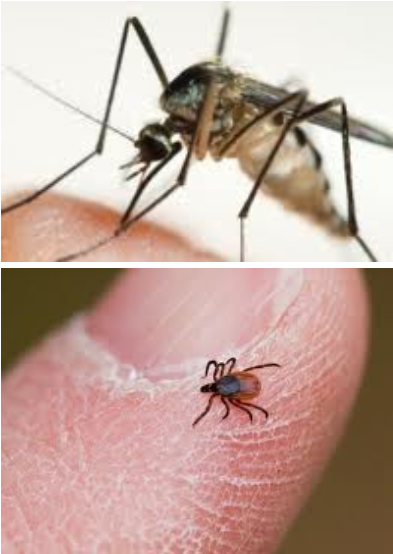Transmission

West Nile Virus can be transmitted through many different ways. Two of the most common ways that a human will be infected with this virus is through insects, specifically through mosquitoes. In most cases in which a human is infected with West NIle Virus, it is due to a mosquito bite. Mosquitoes don't naturally carry this disease. Instead, the mosquitoes will usually become infected after feeding on an infected bird. The West Nile Virus will then make it's way into the mosquitoes salivary glands, and when it bites into it's next victim, that victim, whether human or animal, will become infected. Usually the virus will remain between mosquitoes and birds, but a mosquito carrying the virus can easily bite a human and give the disease to that human.
Ticks are another insect that also are major contributors to the spread of West Nile Virus as well as many other diseases. The way that they contribute to the spread of West Nile Virus, however, is different than that of the mosquito. Ticks will usually not give a human West Nile Virus. They do give the virus to birds. SInce ticks will normally feed on birds, they increase the concentration of birds that are infected with the disease. Because the concentration of birds with West Nile increases, so does the likely hood that a mosquito will bite an infected bird. Finally, more mosquitoes will cary the disease, and the chance of a human getting infected with the virus.
Still, it is very unlikely for humans to become infected with West NIle Virus, especially those who live in North America. In fact, even if you live in a place where West Nile virus is known to be circulated, the chances that you will become infected is only 1%. The West Nile Virus, is also not a contagious disease, you cannot get the disease from touching or kissing someone like mono, for example. There are still ways that you can get the disease other than from a mosquito however. These ways include organ transplants and blood transfusions, but to get the disease in this manner is extremely rare and it is very unlikely to get the disease this way.
Ticks are another insect that also are major contributors to the spread of West Nile Virus as well as many other diseases. The way that they contribute to the spread of West Nile Virus, however, is different than that of the mosquito. Ticks will usually not give a human West Nile Virus. They do give the virus to birds. SInce ticks will normally feed on birds, they increase the concentration of birds that are infected with the disease. Because the concentration of birds with West Nile increases, so does the likely hood that a mosquito will bite an infected bird. Finally, more mosquitoes will cary the disease, and the chance of a human getting infected with the virus.
Still, it is very unlikely for humans to become infected with West NIle Virus, especially those who live in North America. In fact, even if you live in a place where West Nile virus is known to be circulated, the chances that you will become infected is only 1%. The West Nile Virus, is also not a contagious disease, you cannot get the disease from touching or kissing someone like mono, for example. There are still ways that you can get the disease other than from a mosquito however. These ways include organ transplants and blood transfusions, but to get the disease in this manner is extremely rare and it is very unlikely to get the disease this way.
- Stephen Nizzare
